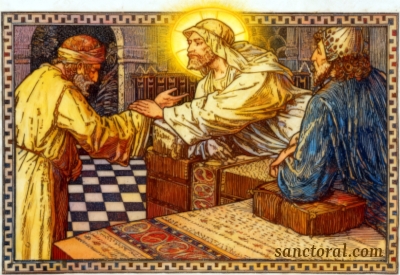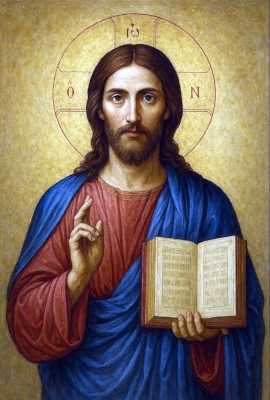Today, like last Sunday, the lessons of the first Nocturn at Matins are taken from the book of Job, when these fifteenth and sixteenth Sunday are the first and second Sundays of September. To-day we continue to read the missal in the light of this portion of the breviary. Job is the very type of a just man whom the devil wishes to humble to the dust to make him rebel against God. And God allowed him to make Job the model of a soul who proclaims the sovereign dominion of God and who submits himself entirely to the divine will. Robbed of everything and seated on his dunghill, Job does not curse the almighty hand of God which has allowed the devil to vent his rage upon him, but rather kisses it with humility. The Introit psalm is an admirable rendering of the spirit of his prayer. “Have mercy on me, O Lord. Bow down Thy ear to me, O Lord, and hear me for I am needy and poor." The Offertory psalm speaks of the “poor and needy man” who implores God : “Withold not Thou, O Lord, Thy tender mercies from me : ... for evils without number have surrounded me... Let them be confounded and ashamed together that seek after my soul to take it away” (Ps. 39, v. 12 and 14). Finally, in the psalm for the Communion we read : “Incline Thy ear unto me... How great troubles hast Thou shown me, many and grievous! Yea and my tongue shall meditate justice all the day, when they shall be confounded and put to shame that seek evils to me” (Ps. 70, v. 2, 20 and 24). Today’s Gospel speaks in the same sense: “Every one that exalteth himself shall be humbled, and he that humbleth himself shall be exalted.” In the sequel, after He had humbled him, God exalted Job and gave him twice as much as he had before. In this respect the patriarch is a type of Christ, who having been humbled to the depths was wonderfully exalted; and he is also a figure of all Christian people to whom God will give a place of honour at the eternal wedding feast if, on earth, they have practised the virtues of humility with a good heart. Pride, says St. Thomas, is a vice by which man seeks to exalt himself beyond right reason above what he is; it is, based on error and illusion. On the contrary, humility is founded upon truth. It is a virtue which tempers and restrains the soul, so that it does not pretend to be more than it really is. The humble soul accepts with complete submission the actual station which falls to it, and which is that assigned to it by God the supreme and infallible Truth. Humility manifested in word and deed, and in our way of bearing trials and contradiction, is the virtue taught us by Job in his whole Ufe and which our Lord sets before us in today’s Gospel. Seeing how the Pharisees chose the best places, He wanted to make them understand the spiritual disease from which they were suffering and so to encourage them to seek its cure. For this purpose He first heals an unfortunate man swollen with sickness and then veiUng the lesson under a parable, seeks to cure the spiritual inflation with which the guests before Him and the majority of men, are only too greatly afflicted. The world is given over to all the boastfulness and infatuation of pride, while humility is the absolute condition of entrance into the kingdom of God. This same virtue, which the Church brings before us in the Collect, which refers to our need that God’s grace should “ever both go before and follow us,” is taught by St Paul in a striking way to Christian people in today’s Epistle. There the apostle explains that without any merit on our part, but solely that we may minister to the praise of His glory, God has chosen us in Christ. While yet we were children of wrath, the almighty, rich in mercy on account of the great love He bore us, restored us to life in Jesus Christ. Heathen and strangers to the covenants of God with Israel, we have been reconciled through the Redeemer’s blood, for He is our peace, who out of two nations has made one and by whom we both have access to the Father in one Spirit. Now we are no longer strangers, but members of the family of God. This is not our work but God’s so that no one has any cause to boast. (Saint Andrew Daily Missal with Vespers for Sundays and Feasts, by Dom Gaspar Lefebvre, O.S.B. of the Abbey of St. André, 1953) (Ps. 85:3 and 5) Have mercy on me, O Lord, for I have cried to Thee all the day; for Thou, O Lord, art sweet and mild and plenteous in mercy to all that call upon Thee. Ps. Bow down Thy ear to me, O Lord, and hear me; for I am needy and poor. Gloria Patri. O Lord, we pray Thee that Thy grace may always precede and follow us, and make us continually intent upon all good works. Through our Lord... St. Paul has been charged by God to proclaim to the Gentiles that like the Jews, they have been chosen to form a part of His people. An entirely free choice which should fill them with gratitude towards God and warn them against that discouragement which is only a form of pride. Lesson of the Epistle of Saint Paul the Apostle to the Ephesians (3:13-21) The Gentiles shall fear Thy name, O Lord, and all the kings of the earth Thy glory. ℣. For the Lord hath built up Sion, and He shall be seen in His majesty. Alleluia, Alleluia. ℣. Sing ye to the Lord a new canticle, because the Lord hath done wonderful things. Alleluia. “Go, sit down in the lowest place,” does not mean that a superior should put himself below his subordinates, or expose his dignity to contempt. He should, however, remember these words of Holy Scripture: “The greater thou art, the more humble thyself in all things; and thou shalt find grace before God” (Ecclesiasticus, 3, 20). Sequel of the holy Gospel according to Luke (14:1-11) (Saint Andrew Daily Missal with Vespers for Sundays and Feasts, by Dom Gaspar Lefebvre, O.S.B. of the Abbey of St. André, 1953)Sixteenth Sunday after Pentecost - Cure of the man with dropsy

Table of Contents
Reflexions on the Liturgy of the Day
Liturgy of the Mass
Introit
Collect
Epistle
Brethren: I pray you not to faint at my tribulations for you, which are your glory. For this cause I bow my knees to the Father of our Lord Jesus Christ, of whom all paternity in heaven and earth is named, that He would grant you, according to the riches of His glory, to be strengthened by His Spirit with might unto the inward man. That Christ may dwell by faith in your hearts; that being rooted and founded in charity, you may be able to comprehend with all the saints, what is the breadth and length, and heighth, and depth. To know also the charity of Christ, which surpasseth all knowledge; that you may be filled unto all the fullness of God. Now to Him who is able to do all things more abundantly than we desire or understand, according to the power that worketh in us: to Him be glory in the Church, and in Christ Jesus, unto all generations, world without end. Amen.Gradual

Gospel
At that time, when Jesus went into the house of one of the chief of the Pharisees on the Sabbath-day to eat bread, they watched Him. And behold, there was a certain man before Him that had dropsy: and Jesus answering, spoke to the lawyers and Pharisees, saying: Is it lawful to heal on the Sabbath-day? But they held their peace: but He taking him, healed him, and sent him away. And answering them, He said: Which of you shall have an ass or an ox fall into a pit, and will not immediately draw him out on the Sabbath-day? And they could not answer Him these things. And He spoke a parable also to them that were invited, marking how they chose the first seats at the table, saying to them: When thou art invited to a wedding, sit not down in the first place, lest perhaps one more honourable than thou be invited by him; and he that invited thee and him, come and say to thee: Give this man place; and then thou begin with shame to take the lowest place. But when thou art invited, go, sit down in the lowest place: that when he who invited thee cometh, he may say to thee: Friend, go up higher: then shalt thou Have glory before them that sit at able whith thee: because everyone that exalteth himself shall be humbled, and he that humbleth himself shall be exalted. Credo